
This week:
- Upcoming Events
- SCiO
- Defining and Managing Organisational Identity
- Cybernetics and the Digital Transition
Upcoming events:
Two new commissioning academies: coming this winter!
Exciting News! Introducing two Commissioning Academies.
- We will be offering a new Virtual Commissioning Academy, launching in October, facilitated entirely online
- and an In-Person Commissioning Academy launching in January, with in-person sessions held in Nottingham.
Both offer the same great content, accredited by the PSTA and Cabinet Office.
Join our flagship development program to transform outcomes for the communities we serve!
- Be part of a national network of commissioning practitioners.
- Learn to initiate and lead change across complex systems.
- Develop capabilities to drive real transformation.
- Access expert insights and collaborative learning.
- Apply innovative ideas and approaches to your work.
Here’s what’s in store for you at the National Commissioning Academy:
- Foundation concepts: Working as a system, outcomes thinking, collaborative working.
- Commissioning for outcomes as a system: Systems thinking, asset-based commissioning, trauma-informed practice, prevention and early intervention.
- Creating conditions for change: Systems leadership, coproduction, innovation, and promoting social value.
Expect a transformative experience with masterclass workshops, action learning, expert speakers, peer challenges, practical action planning, and membership in our nationwide alumni community.
Ready to make a difference? Apply now to secure your spot at the Academy! Contact David Mason at david.mason@publicservicetransformation.org
Systems Thinking Apprenticeship (2023)
We are delighted to share the news that there is now a Level 7 Systems Thinking Practitioner Apprenticeship available in England.
Systems thinking practice was developed specifically to address highly complex, adaptive, and dynamic situations. It helps you to model each situation as a system incorporating many different parts, dependencies and relationships. Systems thinking practitioners are uniquely equipped for achieving large-scale transformational change.
If you live in England, you can benefit from the scheme. The Apprenticeship is a two-and-a-half year, day release, post-graduate qualification with government funding of up to £18,000 per person. It is fully supported by expert tutors, comprehensive learning materials, and ongoing action learning.
This is a practice-based, portfolio assessed programme which draws on core systems approaches and practice skills. You’ll be supported in your job to actually put the learning to work right away, and you will be evaluated on how you incorporate your continual learning into your practice.
It’s been designed by practitioners for practitioners — the people who have not just read the books, but have written them. More importantly, these are people who have been there, done it, know about all (or at least most) of the pitfalls, and can guide you away from them.
The professional body for systems practice, SCiO, is providing world-class systems practitioner-tutors, and is supporting the curriculum development and overall approach of the programme. They are acting in collaboration with Cherith Simmons Learning and Development, who provide the apprenticeship. Further details are available here.
If you’re not in England, you can still sign up to individual modules here.
And if you are interested in developing your transformation skills, take a look at the RedQuadrant tool shed. This is a small group action learning journey with Benjamin Taylor, founder of the consultancy RedQuadrant, supported by 24 online modules covering all aspects of organisational transformation. Get a 20% discount by mentioning Enlightened Enterprise Academy.
Link Collection:
My Weekly Blog post:
In my experience, simplicity often outshines complexity when it comes to problem-solving and decision-making. While there’s no universal solution, certain elegant tools, like the ‘Ways in to Partnership’ concept, can be invaluable. It helps assess collaborative potential effortlessly and offers a clear path forward. The ‘Left Hand Column Exercise’ aids in productive conversations by revealing thoughts and emotions. Other favorites include ‘Three Box Model for Clarity,’ ‘CPORT Task Clarity,’ ‘Four Dynamics for a Robust System,’ and ‘Five Core Practices for Leadership.’ These tools, although diverse, share a common thread of making complex issues more manageable. They form the foundation of my teachings and our RedQuadrant tool shed, offering a lifetime of practical application in just a few minutes of explanation.
What does it all boil down to, for you, in organisations?
In my organizational exploration, I’ve delved into the dynamics of segmentation, blending, empowerment, and harmonization. These concepts, inspired by Barry Oshry and Stafford Beer’s management cybernetics, play a crucial role in human and organizational effectiveness. Segmenting groups people for specialized capabilities, blending fosters knowledge sharing, empowerment unleashes unique talents, and harmonization aligns efforts around a common mission. When one or two of these dynamics dominate, it becomes evident that there are costs involved. By rebalancing associated rituals and practices over time, an organization can enhance its effectiveness. Reflecting on these four dynamics can provide valuable insights into your organization’s functioning.
[I must confess I sniggered when I heard this name. It sounds like a deliberately invented rationalism squared joke… also known as QBism (of course). Not sure about the science myself but / and it feels very cybernetic to me… there are ‘many worlds’ they are just the worlds each of us live in. And with a major antecedent turns out to be Frank Ramsey, therefore a link to Wittgenstein, no wonder! Also there’s a claim that ‘the first quantum Bayesian was von Neumann – truly there were only about 30 people in the 1950s.]
See also
https://www.quantamagazine.org/quantum-bayesianism-explained-by-its-founder-20150604/
Sorry for all these SCiO posts- but worth reminding occasionally how much rich material there is!
Professional Development includes (all online in this list) currently offered:
- Critical Systems Heuristics – foundation, core modules, and advanced
- Consulting for Systems Practice Interventions (a) Foundation and (b) core
- Viable System Model – foundation, Systems Diagnosis, Systems Design, core modules, Organisational Dynamics, and VSM in multi-methodology work
- Patterns of Strategy – foundation, core modules, and advanced
- Introduction to systems practice interventions
- Introduction to gathering information
- Facilitation skills for systems practice interventions
- Workshop design for systems practice interventions
- Stakeholder engagement – productive conversations
- Large group interventions
And the Level 7 Systems Thinking Practitioner Apprenticeship (30 months, Apprenticeship Levy funded in England and Wales) – of which all the above modules form a part.
https://www.systemspractice.org/events/professional-development
- Are you an Apprentice studying Systems Thinking?
- Would you like to join like-minded people in exploring systems, practice, ideas, feelings and difficulties?
If yes to both, then the Enhanced Learning Club is for you!
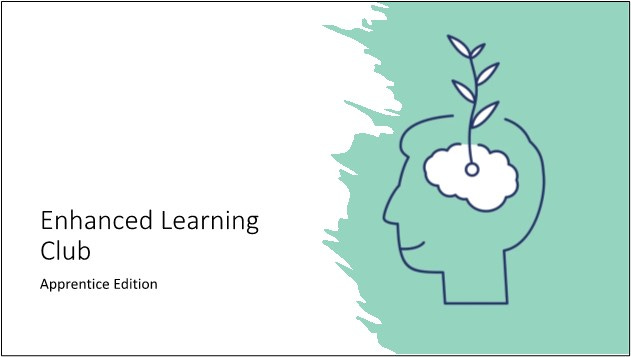
SCiO is opening up Cohort 3 (Apprentice Edition) of the Enhanced Learning Club. Here, we have created a safe and accessible space where we can come together to explore systems ideas, concepts and approaches and together, grow our understanding and confidence.
This is the place to ask the ‘silly’ questions, to discuss your difficulties, to share your ideas and interpretations whilst helping others do the same. In the ELC, there are no novices, and no experts.
Please note: This cohort is open to anyone formally studying Systems Thinking and practice.
SCiO Enhanced Learning ClubAre you an Apprentice studying Systems Thinking?Would you like to join like-minded people in exploring systems, practice, ideas, feelings and difficulties?If yes to both, then the Enhanced Learning Club is for you!ImageSCiO is opening up Cohort 3 (Apprentice Edition) of the Enhanced Learning Club. Here, we have created a safe and accessible space where we can come together to explore systems ideas, concepts and approaches and together, grow our understanding and confidence.This is the place to ask the ‘silly’ questions, to discuss your difficulties, to share your ideas and interpretations whilst helping others do the same. In the ELC, there are no novices, and no experts.Please note: This cohort is open to anyone formally studying Systems Thinking and practice.
SCiO has created a framework of competencies for members who are practitioners of systems thinking, based on our Systems Thinking Body of Knowledge (SysBoK), the systems laws regularly explored in Development Days, and this is aligned to the Institute for Apprenticeship (IfA) Systems Thinking Practice L7 accreditation and their framework of Knowledge, Skills & Behaviours.
This framework details competencies, along with a method for members to self-assess their skill ability, mapping of extent of practice, and evidence, against …
- Systems Knowledge and Skills
- Systems Thinking Knowledge and Skills
- Intervention Skills
The SCiO Competency Framework portfolio form can be downloaded by clicking here and is used to commence the self-assessment process. If you require an editable form of the portfolio form please contact: tony.korycki@systemspractice.org. The CF resource guide that provides references for each item in the portfolio form can be downloaded by clicking here.
Professional Qualification in Systems Practice
To apply for a professional qualification, please download and complete the Competency Framework (CF) portfolio form, then return it to: contact@systemspractitionerassessment.org
The fee for undertaking the assessment is £95. Once qualified, you may be invited by SCiO or SPA to carry out assessments of other members of SCiO applying for a professional qualification. SCiO CF assessment is carried out by Systems Practitioner Assessment Ltd (SPA) for SCiO, and uses a four-step process:
- You begin by reviewing your capabilities as a practitioner against the CF criteria, using the CF Resources as needed. You can obtain advice about these documents from: contact@systemspractitionerassessment.org
- If you would like a practitioner grading awarded, you may submit your CF self-assessment to contact@systemspractitionerassessment.org, and we will contact you within 20 working days, to arrange a CF assessment interview.
- Self-assessment review and competency grading is supported by an assessment interview with two Systems Thinking practitioners, using a method based on exploration of a number of practice situations, using standard criteria: Situation, Objectives/Goals, Actions, Results and Aftermath/Learning, the SOARA method.
- On completion of this 2-hour assessment interview, we will award you a practitioner grade.
If you submit your CF for review and grading, this will be based on the following criteria:
Practitioner
- Able to use one or more systems methodologies or methods with support, with at least a skill level of ‘2’ in your primary approach.
- Able to use one or more of the intervention approaches that are consistent with and required for their chosen systems methodology or method.
- May have practiced on systemic issues in only one sector or organisation, and may have only practiced in a part of an organisation that they control or manage.
Certified Practitioner
- Able to use one or more systems methodologies or methods without support, with at least a skill level of ‘3’ in your primary approach.
- Can use several intervention approaches that are consistent with and required for their chosen systems methods or methodologies, and has applied a range of options for how to plan, manage and execute an intervention.
- May have practiced on systemic issues in only one organisation, and may have only practiced within their own organisation, but will have worked in or on organisations outside their immediate control.
Advanced Practitioner
- Able to use and supervise others in at least three systems methodologies or methods, and can apply systems laws and principles directly to situations.
- Can use several intervention approaches that are consistent with and required for their chosen systems methods or methodologies, and has applied a range of options for how to plan, manage and execute an intervention.
- Will have practiced on systemic outside of their own organisation. This does not mean being contracted out of a “home” organisation, but must have worked on situations wider than just contained within the home organisation.
Fellow
- Has developed one or more new systems methodologies or methods that others can use, and can apply systems laws and principles directly to situations.
- Can use several intervention approaches that are consistent with and required for their chosen systems methods or methodologies, and has applied a range of options for how to plan, manage and execute an intervention.
- Will have practiced in multiple sectors, and/or on systemic issues outside of their organisation. Will have worked on multi-organisational problems.
In addition to the above gradings, SCiO may also award a supplementary title of Technical Expert in specific fields to applicants who are able to show that they:
- Can supervise others in the use of one or more systems thinking methods or methodologies.
- Can train others in the use of one or more systems thinking methods or methodologies.
Classification at skill levels will support mentoring, continual professional development priorities and support for IfA systems thinking practitioner apprenticeship assessment.
SCiO manages the Competency Framework criteria and resource guide of references according to a specific policy and procedure; if you have any issues, concerns or proposals for improvement relating to the CF items or reference resources, you can access this document by clicking here.
SCiO Competency Framework & Professional Qualification | SCiO

Shifting minds and shifting sands
In this talk, Simon will share some of his experiences in working with government-linked bodies in Asia and the Middle East seeking to harness new opportunities: to do new things or to do things differently. And yes: systems thinking can provide a solid basis for shaping and harnessing positive change, not just serve its traditional purpose of addressing the negative effects of ‘problematic situations’. As Donella Meadows wrote in the late 1990s,… Read more
October 2023
Video Presentation

There is a split within Systems in both thinking and practice around purpose. Is it about ‘intention’ or is it about effects – the POSIWID position. This split is not limited to the field of systems, as an example it also splits the field of ethics, but for us in our discipline it has had enormous consequences. This talk will explore this from several angles – why the split exists, how different approaches are grouped either side of the split, ho… Read more
October 2023

New Meta-systems Thinking for Regenerative Leadership
Socially, we see a trend in organizations toward being more conscious and sustainable. The number of companies seeking to reduce their carbon footprint to zero is growing. To achieve this, new business and operational models are emerging, often focused on ecosystemic collaboration. Often a broad common ground is lacking, and one must cooperate in diversity. The leadership required for this requires significantly better assessing the parties’ pos… Read more
October 2023

Whatever works – Adventures of a couple of systems consultants in IT organizations
In this light-hearted talk Ed van der Winden will share some of his experiences in trying to help IT departments move to a better place. A lot of systems models have played a role in this: the talk will focus on examples of their practical use. Some of the more well-known models that will be discussed in this talk will be: The Viable System Model, causal loop diagrams and Fernando Flores’ conversations-for-action model. But also lesser known mode… Read more
October 2023

Critical Thinking: an argument clinic
Methods such as Critical Systems Heuristics and Boundary Critique use the idea of evaluation and assessment in specific ways, within those approaches. However, what does critique mean, why do we use it, and how is critical thinking useful or important for Systems Thinking practitioners?
September 2023

Standard Causal Loop Diagrams from systems dynamics are very effective tools for describing and structuring complex problems. It enables conversations and brings different perspectives into the analysis for improving the decision-making process. However, Causal Loop Diagrams have three main limitations, i) The nature of the relationships prevents integrating people into the model effectively, ii) Navigation complexity increases exponentially as … Read more
September 2023

Systemic Posture: Five movements for successful relationships (workshop)
When it is time for relationships in the professional realm, switching from an individualistic or interventionist approach to one with a systemic posture is a great support in professional life as well as a “life rule” for any relationship in a healthy, truthful, harmonious and effective and productive, creative way. Lucia’s workshop took participants through a number of thoughts about inter-relationship, which were used to guide dialogue and ac… Read more
September 2023

Epistemology, Agnotology and Systems Thinking practice
Epistemology (theory of knowledge) addresses several questions which are pertinent to Systems Thinking practice. For example, social epistemology is concerned with epistemic communities of practice, including the formation and crossing of disciplinary boundaries, the development of localised epistemic standards relating to the purpose of the discipline, and the relationship between consensus, dissensus, and political power. Meanwhile, agnotologys… Read more
September 2023

How Can We Lead Transformative Change
Gioia (pron. Joya) Caminada will illustrate a model for leading transformative change based on the human dimensions of acting, feeling, being and thinking she designed drawing from psychologist Paul Watzlawick’s theory of transformative change. She will use the case study of Colombia’s Escuela Nueva (new school) system as an example of transformation within a complex system. Paul Watzlawick was a family therapist, communication theorist, Stanfo… Read more

July 2023

Hospital management from a systemic perspective, using VSM
A case study, using the Viable Systems Model, exploring management problems of increasing complexity in a merger of several municipal hospitals. After a short introduction of VSM, different management structures and tools of hospital management (senior management, risk, quality, controlling, etc.) are mapped to the VSM systems. Special emphasis is placed on the interaction of different systems as well as the influence of environmental changes s… Read more
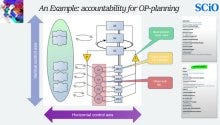
July 2023

Regenesis: Feeding the World without Devouring the Planet
The global food system suffers from some of the same vulnerabilities as the global finance system in the approach to 2008. Policy makers have ignored repeated warnings in the scientific literature that it is losing its resilience. The amplification of shocks to the system is likely to explain one of the most disturbing of all global trends: following decades in which chronic hunger declined, since 2015 it has been rising. A systems approach is es… Read more

May 2023

Learning Strategies for Sustainable Organisations
Organisations looking to follow strategies for social or environmental sustainable operation need to make sure that their people have the necessary knowledge and skills to enable this to happen. The complexity of the sustainability challenge makes systems thinking a powerful tool to use in developing learning and development strategies. Drawing on his recently published book, “Learning strategies for sustainable organisations”, Bryan Hopkins will… Read more
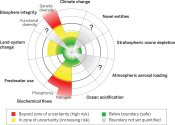
May 2023

Krankenhausführung aus systemtheoretischer Sicht am Beispiel von VSM
Vortrag von Matvei Tobman, Chirung und Risikomanager im Krankenhaus. Nach einer kurzen Vorstellung des VSM als zentrale Struktur des Vortrags, werden verschiedene Führungsstrukturen und Tools des Krankenhausmana-gements (GF, Risikomanagement, QM, Controlling usw.) den VSM-Systemen zugeordnet. Besonderer Schwerpunkt liegt hierbei auf dem Zusammenspiel verschiedener Systeme sowie dem Einfluss von Umweltveränderungen wie Gesetzgebung, Änderungen der… Read more

April 2023

Tadhg O’Mahoney (Dr)Anne Pender
Systemic Transformations to Sustainable Futures
Speakers: Anne Pender, University College Dublin; and Dr. Tadhg O’Mahoney, Research Fellow at Dublin City University Centre for Climate & Society, and an expert advisor at the Finland Futures Research Centre.
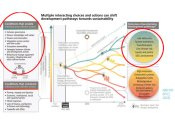
March 2023
Video Presentation Presentation

Natural science approach to studying the emergent organization of systems
The talk will be in two sections, the first on the emerging organization of systems as they grow. The second will be on ways of a) leaving them alone or b) helping them steer. So far, science has given less attention to how nature works by itself, giving much more to how people can make rules for controlling it, and that seems to be a principal reason for our current global crisis. Part 1. The science. Natural systems emerge from some energizing… Read more
March 2023

Pensando en sistemas cuando diseñamos soluciones con tecnologías emergentes.
Sistemas + Diseño + Datos. ¿Es esta la fórmula para desarrollar soluciones que den respuesta a los problemas complejos a los que nos enfrentamos? Nur Karadeniz, en nuestra segunda sesión internacional, nos hablará de cómo usa el pensamiento sistémico en el proceso de diseño. Activa los subtítulos y la traducción automática para verlos en castellano.

January 2023

This session presents how the reality of informal networks within organisations and across collaborating entities can be presented visually. Also, using case study material, how these dynamic maps are able to generate insights that enable groups and teams to overcome challenges and realise opportunities that hitherto would be invisible to them. We hope this session will stimulate an interesting discussion, and aim to leave plenty of time for t… Read more
January 2023

A Systems Approach to Investigation and Problem Solving
The terms ‘Accident’ and ‘Incident’, while in general accepted usage, are not helpful to professional in-company investigators. The proposition is that it is more useful to consider such events as failures of ‘Human Activity Systems’. This methodology, Kelvin TOP-SET, was initially developed to give offshore oil managers a means of investigation that was relatively easy to learn and apply. Practical and reliable in its outcome it is now used in… Read more
January 2023

Introducción al diseño de mapas sistémicos
Bárbara López nos acerca a la construcción de mapas sistémicos como herramienta para describir la realidad, facilitar conversaciones y construir una visión compartida sobre situaciones complejas. Comenzará acercándonos al trabajo de Donella Meadows y la dinámica de sistemas, como marco del que nacen los diagramas causales, para pasar la parte práctica de la sesión donde construiremos paso a paso un diagrama causal. Finalmente, trabajaremos en u… Read more
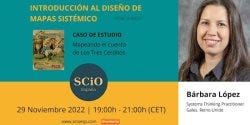
November 2022

Human Aspects of Systems – Map of Meaningful Work
I have a particular interest in the human aspect of systems, and the presentation is around the theme of what might serve as a map to help us navigate systems. The session will be based on the Map of Meaningful Work, a well validated tool for such purposes.
November 2022

Moving beyond Value Conflicts: Systems Thinking in Action
Value conflicts can become entrenched in destructive patterns of mutual stigmatization, which inhibit the emergence of new understandings of the situation and actions for improvement. In extreme cases, such patterns can even lead to violence. This presentation offers a new systems theory of value conflict, which suggests the possibility of three different strategies for intervention: supporting people in transcending overly narrow value judgeme… Read more
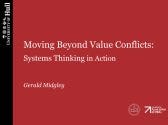
November 2022

La dinámica del diálogo trabajando con el Modelo de Sistema Viable
Dividimos esta sesión en 4 capítulos para flexibilizar su consulta. Puedes acceder a la traducción automática de Yotube. Te pedimos disculpas de antemano por los pequeños errores que se puedan producir en la interpretación del contenido. ¿Cómo pueden las personas dar sentido a la complejidad a la que se enfrentan en sus organizaciones?¿hay alguna forma mejor de organizar el trabajo que la división funcional de tareas?¿es la autoorganización de l… Read more
October 2022

Autopoiesis – Simplified translation from Biology to Business
In recent decades, many people perceive that changes in professional life are accelerating. The world is becoming more and more interconnected and complex. Everything seems to be connected to everything else. Because of these changes, decisions are becoming increasingly decentralized. Employees are being given entrepreneurial responsibility. Companies expect their employees to demonstrate the same level of self-organization as self-employed peopl… Read more
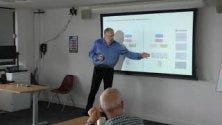
September 2022
Video Presentation

Critical Social Learning Systems: an inquiry, case study and some learning
Social learning is a set of principles, activities and behaviours, relating to how people collaborate and co-operate to learn in a variety of situations within institutional and organisational structures. This presentation explores its principles and methods, as well as providing an illustration of how it has been applied in a micro-enterprise environment, where individuals or small organisations often interact in informal ways.
September 2022
Presentation Document

I have yet to find the word ‘cybernetics’ in mainstream writing on government and yet the comparison to steering a ship appears in the writing of Plato 2,500 years ago on government, and the word itself in the writing of Ampere 300 years ago. Beer’s cybernetic approach to systems thinking upon which he based his VSM gives a foundation from which I explore the purpose and structure of democracy.
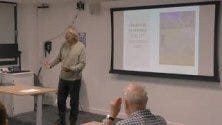
September 2022

A case study of warping and weaving systems methods
Practitioners always need to be alive to the tension between “paralysis through analysis” and JFDI. This talk is a personal retrospective on Niki’s experience of supporting a government policy lead take the first steps in establishing a national operational capability and seeking to get that balance right. She will describe the approach she took, weaving a variety of systems thinking methods together to help her stakeholders tackle this comple… Read more
September 2022
Presentation

When Unfreeze-Move-Refreeze Isn’t Working: Doing, Thinking and Making Via Systems Changes Learning
When Unfreeze-Move-Refreeze Isn’t Working: Doing, Thinking and Making Via Systems Changes Learning Practitioners coming to the systems sciences and/or systems thinking have an interest in “systems change(s)”. Many come from premise that that change occurs as “unfreeze-move-refreeze”, misattributed to Kurt Lewin. A more reflective view of systems changes not only sees distinctions between the intended and emergent recognized by Henry Mintzberg,… Read more

July 2022
Video Presentation

Systems Leadership, Change, Theory and Practice
Systems Leadership and Systems Change are very popular phrases at the moment – search the web for a sense (and Medium.com if you really want to boggle your mind). Some of it is really good, some of it is risible, and much has little to do with systems thinking or systems practice. This session will explore some of the existing territory and dimensions and sketch out Benjamin’s approach, drawing on two of his articles from last year (reading the… Read more
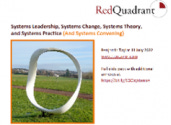
July 2022
Video Presentation

Antoni Oliva QuesadaMiguel Pantaleon
¿Qué es y qué pretende la modelización mediante dinámica de sistemas?
Antoni Oliva Quesada nos habla de cómo usar modelos de simulación para comprender cuáles son los factores que hacen que un problema complejo se comporte como lo hace. Para mí, el propio concepto de que los sistemas son dinámicos ya es profundo y retador en sí mismo, porque sugiere que éstos cambian y evoluciona con el tiempo. Esto implica que hay factores que pueden hacerlos cambiar más rápido o mas lento y que, por extensión, puede que tengamos … Read more

May 2022

How do we transform a zombie organisation into a conscious collective?
Nobody really understands their business….but how well does the business understand itself? In this talk will use a case study to demonstrate how a zombie organisation can transform itself into conscious collective and become the compute function for its own operation.

May 2022
Video Presentation

Systems Thinking and Adult Development in a Community Development Setting
This presentation charts the journey of Public Health’s engagement with systems thinking, initially via Theory U and later through Community Operational Research methods. The practical application, pitfalls, considerations of using these methods in community settings brings this, sometimes conceptual focus, into the “real” world. The emergence of Adult Development as a seam of research that helps to bring a sense of movement to seemingly intrac… Read more
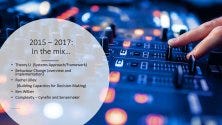
May 2022
Video Presentation

Roger Duck and Jane Searles share their recent experience of creating conditions to enable exploration of transformational systemic change. The work involved the collaborative development of a visionary whole system transition architecture. The specific context was regional transport, but the systemic methodology is of more general application, and they are keen to discuss with others in the interest of mutual learning. This work was originally… Read more
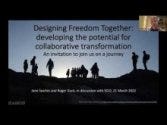
March 2022
Video Presentation Document

Patrick talks about his new book ‘The Grammar of Systems’ which is in two parts: the ‘Grammar’ describing 33 Systems Laws and Principles and how to use them; and ‘How to think like a Systems Thinker’ which goes through 9 thought patterns involved in systems thinking. In the session he looks at the overall picture that the laws make when taken as a whole and then focuses on the 9 thought patterns, why each is important in systems, how they rel… Read more

March 2022

In deze sessie vertrekken we vanuit de socio-technische systeemtheorie (STS). Seth heeft een lange academische opleiding en loopbaan genoten in deze wetenschap, en heeft deze benadering vervolgens met veel vallen en bijna even veel opstaan naar de praktijk gebracht in het afgelopen decennium. Een korte inleiding schetst STS als een theorie van zelfsturende teams. Aan de hand van praktijkvoorbeelden komen de mogelijkheden en beperkingen van deze t… Read more
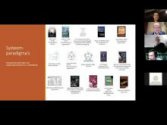
March 2022

SCiO DACH – Einführung in das Viable System Model
Einführung in das Viable System Model durch Michael Frahm. Der Termin richtet sich an „VSM-Neulinge“, aber auch an alle Interessierten, welche sich eingehend mit den Basics des Models beschäftigen wollen. Nach der Präsentation und einigen Beispielen aus der Praxis besteht die Möglichkeit, Fragen zu stellen und zur allgemeinen Diskussion.
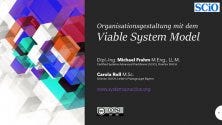
February 2022
Video Presentation

Beverley Wenger-TraynerEtienne Wenger-Trayner
Systems convening: an approach to systemic learning capability for non-systems theorists
We describe the work of people who take a systems convening approach, whether they know it or not. We articulate the mindset with which they approach the work and the different dimensions of that work.It’s a context-based, non-prescriptive conceptualisation based on people’s experiences. Presenters: Bev and Etienne Wenger-Trayner; Social Learning Theorists & Consultants
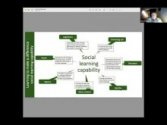
January 2022
Video Presentation Link

The Future Matrix: a Practical Approach to an Uncertain Future
Introducing scenario planning modified for quick deployment and iteration, adding a dimension to finding solutions for business with complicated or complex systems. Julio introduces the 7 phases of the matrix: identify, classify, articulate, numbers, systems, engage and evaluate, and offers examples for how this approach can be used in real-life situations. We can prepare for an ‘unknown’ future! Presenter: Julio Graham: Managing Director, Oliv… Read more

January 2022
Video Presentation

Principles for Systemic Governance
Humans developed the capacity to walk x years ago. But without feedback we’d still be crawling. We would not have learnt from our stumbling mistakes. Can modern government work without feedback? Can any system? This session is a combined presentation and co-production.Cybernetics is its theoretical basis and circular causality or feedback—that is, where the outcomes of actions are taken as inputs for further action. The gaping hole at the centre… Read more

November 2021
Video

A Systems Theory of Marginalization and its Implications for Systemic Intervention
In this talk, Gerald Midgley will present the systems theory of marginalization that he has been developing and applying in systemic interventions for almost 30 years. This theory offers a generic model of marginalization processes that is equally relevant to relationships between people in small groups, organizations, communities and international relations. Both people and the issues that concern them can become marginalized. Gerald will share… Read more
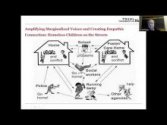
November 2021

“Más allá del Sentido Común”. Cómo realizar las complejas transformaciones del Siglo XXI
El sentido común nos impide abordar las transformaciones profundas que el mundo necesita, porque es justamente lo que ha generado los complejos problemas del Siglo XXI, como las desigualdades, las discriminaciones, la crisis climática, la destrucción ambiental, el narcotráfico o las oleadas de personas que migran buscando dignidad. El sentido común es un modo de actuar automático que está instalado en nuestras mentes y culturas desde hace cuatro… Read more

October 2021
Video Presentation

Análisis de Redes Organizacionales
¿Por qué es relevante para la estrategia o el diseño organizacional? Permite identificar a las personas clave que pueden contribuir a mejorar el desempeño gracias a su influencia. Permite también identificar los vacíos estructurales que incrementan la fragilidad de la organización.
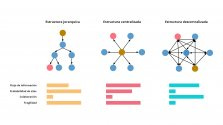
September 2021

Systems Thinking en la práctica
El pensamiento sistémico es un marco de pensamiento teórico que no siempre es sencillo de llevar a la práctica (¡más bien al contrario!). En esta minicharla Eduardo mostrará la forma en la que trata de aplicarlo a su actividad profesional (consultoría para desarrollar proyectos y empresas más sostenibles y responsables), reflexionando sobre las cosas que le funcionan y las limitaciones que encuentra.

September 2021

A Sustainability-focused Learning Strategy for Organisations
Organisations are coming under increasing pressure to work sustainably, both environmentally and socially. That will require a process of more or less adaptation, involving varying degrees of organisational learning. But what needs to be learnt? The Viable System Model has the potential to be a very powerful way of identifying what people within organisations need to learn. Based on extensive research carried out in the course of writing his for… Read more
September 2021
Video Presentation Book

Defining and Managing Organisational Identity using Structural Coupling and Fractal Enterprise Model
Saying, such as, “Tell me who your friends are and I’ll tell who you are” or “Tell me who your enemy is, and I will tell you who you are” presume that a person’s identity could be derived from the person’s environment. Can the same be done for organizational identity? According to Patrick Hoverstadt, it can be done by exploiting the concept of structural coupling that comes from biological cybernetic, more exactly from the works of Maturana and … Read more
September 2021
Video Presentation

Cybernetic Thinking Applied to Regulation of Organisational Financing
The Viable Systems Model is an elegant and profound intellectual achievement, but its practical impact and recognition is limited, at least in the world of business. In this talk Steve Morlidge will demonstrate how he has introduced cybernetic thinking into the design and description of innovative management practices to improve the regulation of organisational financial resources, specifically: Alternatives to traditional annual budgeting, Busin… Read more
What are ‘the laws of biology’? – Mitchell (2023)
Without tackling the fundamental philosophy of biological complexity, we might never truly understand how living organisms work
Kevin J Mitchell is associate professor in developmental neurobiology at Trinity College, Dublin. He can be found on Twitter @WiringtheBrain
The Biologist 64(6) p6
What are ‘the laws of biology’?Without tackling the fundamental philosophy of biological complexity, we might never truly understand how living organisms workThe Biologist 64(6) p6
Progress in Biophysics and Molecular Biology – Miller, Baluska and Reber (2023)
Volume 182, September 2023, Pages 34-48
A revised central dogma for the 21st century: All biology is cognitive information processing
William B. Miller Jr. a
, František Baluška b
, Arthur S. Reber c
https://doi.org/10.1016/j.pbiomolbio.2023.05.005Get rights and content
Abstract
Crick’s Central Dogma has been a foundational aspect of 20th century biology, describing an implicit relationship governing the flow of information in biological systems in biomolecular terms. Accumulating scientific discoveries support the need for a revised Central Dogma to buttress evolutionary biology’s still-fledgling migration from a Neodarwinian canon. A reformulated Central Dogma to meet contemporary biology is proposed: all biology is cognitive information processing. Central to this contention is the recognition that life is the self-referential state, instantiated within the cellular form. Self-referential cells act to sustain themselves and to do so, cells must be in consistent harmony with their environment. That consonance is achieved by the continuous assimilation of environmental cues and stresses as information to self-referential observers. All received cellular information must be analyzed to be deployed as cellular problem-solving to maintain homeorhetic equipoise. However, the effective implementation of information is definitively a function of orderly information management. Consequently, effective cellular problem-solving is information processing and management. The epicenter of that cellular information processing is its self-referential internal measurement. All further biological self-organization initiates from this obligate activity. As the internal measurement by cells of information is self-referential by definition, self-reference is biological self-organization, underpinning 21st century Cognition-Based Biology.
A revised central dogma for the 21st century: All biology is cognitive information processingAuthor links open overlay panelWilliam B. Miller Jr. a, František Baluška b, Arthur S. Reber c
Some upcoming systems | complexity | cybernetics evens from ‘The Prometheus Project’
The project:
https://theprometheusproject.squarespace.com/
- WED, OCT 25 • 5:00PM
Voices | David Peter Stroh | Beyond Systems Theory- TUE, NOV 7 • 5:00PM
Voices | Tom Kerwin | Complex Innovators- MON, NOV 20 • 5:00PM
Voices | Amanda Goodall Ph.D. | Competent Leaders- WED, DEC 6 • 3:00PM
Voices | Dr. Sheena Mason | Racelessness- MON, DEC 18 • 3:00PM
Voices | Nora Bateson | Complex Topics
Cybernetics and the Digital Transition – Beckford (2023)
On his website, John Beckford writes:
I was invited by ‘Metaphorum’, a community of practice developing and applying the work of Stafford Beer, to share some thoughts and insights in the field of cybernetics.
The slides can be found here: https://metaphorum.org/webinars-2023-september-december
The video can be found here:
Cybernetics and the Digital Transition – Beckford Consulting
Forthcoming systems / cybernetics events via ISSS – LOTS!
INCOSE
SEQM WG: Quality Management Institute Training – Cohort 4
Tues 5th September 3.30pm ET
Systems Dynamics Society
Health Policy SIG Sept-2023: Claire Brereton — A systems approach to children’s health in Least Developed Countries
Thurs 7th September 11am-12pm EDT
World Complexity Science Academy (WCSA)
11th World Complexity Science Academy Conference – The Complexity of Sustainability
Sun 10th- Fri 15th September 2023
OR Society
Annual Conference OR65
Tues 12th-Thurs 14th September 2023
INCOSE
SAE & NASA: Energy & Mobility Conference and Expo
Tues 12th-Fri 15th September 2023
Luhmann Conference 2023 | Environments. Observed with social systems theory
Tues 12th-Fri 15th September 2023
Metaphorum
An overview of a global discussion platform with Ian Kendrick and John Waters
Wed 13th September 5-6.30pm BST
Enlightened Enterprise Academy
Rethinking Reputation Risk: From Values to Value Creation
Starting Thurs 14th September 2023 for 10 weeks
UK Systems Society (UKSS)
UK Systems Society International Conference 2023
Thurs 14th – Fri 15th September 2023
INCOSE
2023 Annual INCOSE Western States Regional Conference (WSRC)
Thurs 14th – Sat 16th September 2023
SCiO
SCiO Open Meeting – 18th September 2023
Mon 18th Sept 10am-5pm GMT
https://www.systemspractice.org/events/scio-open-meeting-18th-september-2023
INCOSE
12th Nordic Systems Engineering Tour 2023
Wed 20th-Fri 22nd September 2023
Systems Dynamics Society
System Dynamics for Beginners – Hands-on Training
Fri 22nd September 3-4.30pm WAT
Enlightened Enterprise Academy
Critical Systems Thinking and the Management of Complexity with Dr Mike C Jackson OBE
Starting Tues 26th September for 8 weeks
Metaphorum
The Santiago Boys – Cybersyn’s Podcast
A Panel with Evgeny Morozov
Tues 26th September 5-6.30pm BST
INCOSE
INCOSE Los Angeles: Operational Analysis and Mission Engineering: A strategy and framework to develop any industrial ecosystem
Tues 26th September 5.30-7.30pm PDT
Metaphorum
The Cybersyn Project with Professor Raul Espejo
Fri 29th September 5-6.30pm BST
INCOSE
INCOSE Los Angeles: Tenth Annual Mars Rover Updates & Professional Society Expo!
Sat 30th September 1-5pm PDT
NATO Modelling and Simulation Centre of Excellence
NATO Computer Assisted Analysis, eXercise, and eXperimentation Forum (CA2X2 Forum)
Tues 3rd to Thurs 5th October 2023
NATO Computer Assisted Analysis, eXercise, and eXperimentation Forum (CA2X2 Forum)
SCiO
SCiO Global mini-Conference and AGM
Wed 4th October 9am-1pm BST
https://www.systemspractice.org/events/scio-global-mini-conference-and-agm
Metaphorum
Cybernetics and the Digital Transition (and the Cybernetics OF the Digital Transition) with John Beckford
Wed 4th October 5-6.30pm BST
Systems Dynamics Society
Health policy SIG Oct 2023: Research presentation by Vinaytosh Mishra on the use of system thinking in healthcare /supply chains (tentative)
Thurs 5th October 11am-12pm EDT
Vinaytosh Mishra – System Dynamics Modeling for Prevalence, Prevention, and Control of Diabetes
INCOSE
INCOSE LatAm: Maximizing the value of the digital transformation in engineering organizations
Thurs 5th October 6-7pm ET
INCOSE
INCOSE/GfSE Webinar 15: Very Advanced Systems Engineering with FAS – Part I
Wed 11th October 11am-12pm ET
INCOSE
INCOSE Enchantment: A Conceptual Framework for the SE of AI-Intensive Systems (SE4AI) – Considering Data Through the Life Cycle
Wed 11th October 4.45-6pm MT
INCOSE
AOSEC 2023– Asia Oceania Systems Engineering Conference
Wed 11th-Sat 14th October 2023
https://www.incose.org/events-and-news/search-events/2023/10/11/default-calendar/aosec-2023
INCOSE
2023 INCOSE New England 5th Annual Fall Workshop
Thurs 12th-Fri 13th October 2023
CECAN
Setting Boundaries in Evaluation; The role of Critical Systems Heuristics
Wed 18th October 10-11am BST
https://mailchi.mp/8e4dd1c03484/cecanwebinar-6655710?e=68c639d876
The Cybernetics Society
The Cybernetics Conversation 2023
Mon 23rd – Wed 25th October 2023
INCOSE
Society of Women Engineers WE Conference – WE23
Thurs 26th – Sat 28th October 2023
WPI Systems Dynamics
Moo-Hyuk Lee on “Examining Outmigration in South Korea from the Patients’ and Providers’ Perspective: A System Dynamics Approach”
Fri 27th October 11am-12pm EDT
INCOSE
CSD&M (Complex Systems Design & Management) International Conference
Mon 30th-Tues 31st October 2023
Group Imago and the Stages of Group Development – Clarkson
Group Imago and the Stages of Group DevelopmentPetrūska ClarksonPages 36-50 | Published online: 28 Dec 2017
Group Imago and the Stages of Group Development: Transactional Analysis Journal: Vol 21, No 1
https://www.tandfonline.com/doi/abs/10.1177/036215379102100106
Odd but (in my experience) OK download link
https://dokumen.tips/documents/clarkson-group-imago.html?page=1
Interpretation
Group Imago and Group Development: Two Theoretical Additions and Some Ensuing Adjustments
- February 2014
- Transactional Analysis Journal 43(4):321-333
SYSTEMIC TEAM COACHING – Peter Hawkins
[A selection of sources]
PODCAST SHOW NOTES – DR. PETER HAWKINS
SYSTEMIC TEAM COACHING: COACHING THE 5 DISCIPLINES OF SUCCESSFUL TEAM PRACTICEPODCAST SHOW NOTES – DR. PETER HAWKINS
Dr. Peter Hawkins. Systemic Team Coaching: Coaching the 5 Disciplines
https://teamcoachingzone.com/dr-peterhawkins
The six lenses of systemic team coaching
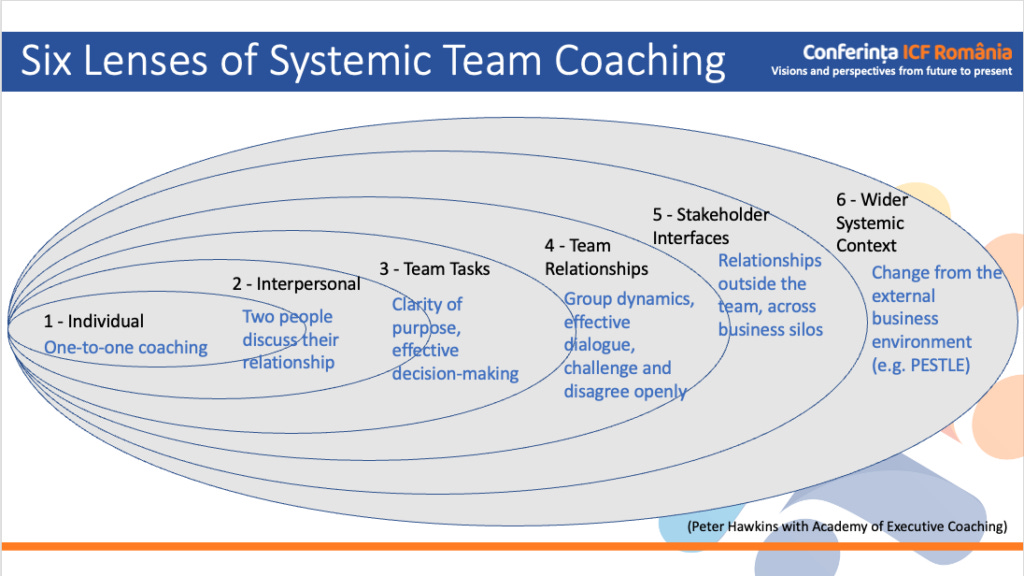
Achieve Business Agility with the Six Lenses of Systemic Team Coaching
Five disciplines of a highly effective team
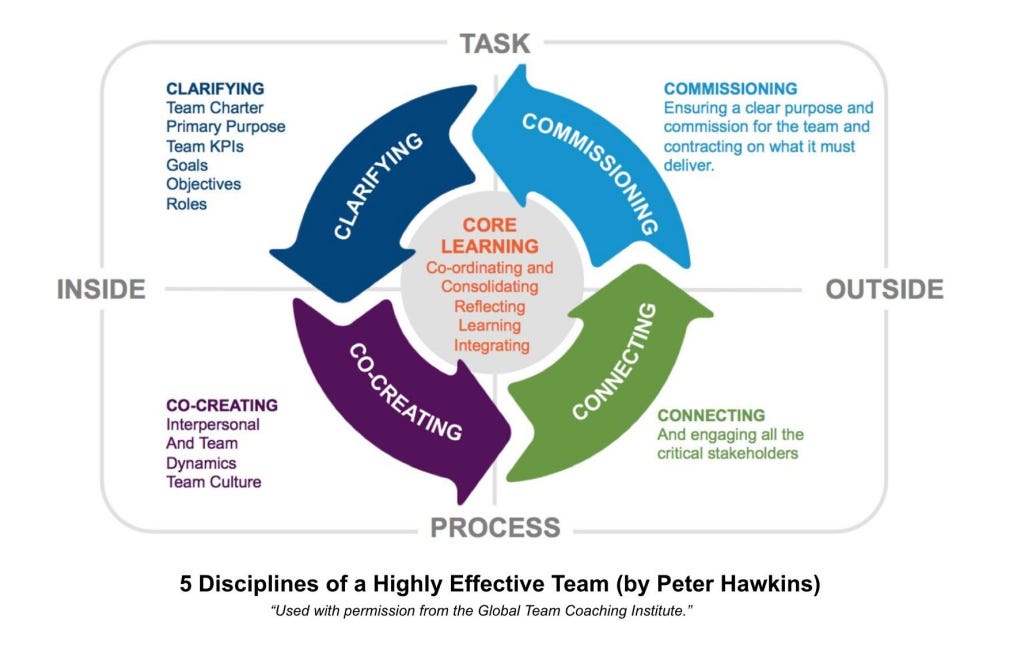
https://www.digitalleadership.ltd/blog/2021/2/25/effective-teams
Videos
And a piece that may actually be from Peter
Mapping healthcare systems: negotiating multiple outcomes (Handbook) – Landa-Avila et al (2021)
posted on 2021-11-25, 13:24 authored by Cecilia Landa-AvilaCecilia Landa-Avila, Gyuchan Thomas JunGyuchan Thomas Jun, Carolina Escobar-Tello, Rebecca Cain
Mapping healthcare systems: negotiating multiple outcomes (Handbook) CiteDownload (11.29 MB)ShareEmbed+ CollectOnline Resource posted on 2021-11-25, 13:24 authored by Cecilia Landa-AvilaCecilia Landa-Avila, Gyuchan Thomas JunGyuchan Thomas Jun, Carolina Escobar-Tello, Rebecca Cain
Mapping healthcare systems: negotiating multiple outcomes (Handbook)
The machine for living in the conversational age – van Stralen (2015)
ISSN: 0368-492X
Article publication date: 7 September 2015
The machine for living in the conversational ageMateus van Stralen KybernetesISSN: 0368-492XArticle publication date: 7 September 2015
The machine for living in the conversational age | Emerald Insight
Complexity Theory: A Science of Cultural Systems? Cham and Johnson (2007)
Authors
DOI:
https://doi.org/10.5204/mcj.2672
How to Cite
Cham, K., & Johnson, J. (2007). Complexity Theory: A Science of Cultural Systems?. M/C Journal, 10(3). https://doi.org/10.5204/mcj.2672
Complexity TheoryA Science of Cultural Systems?AuthorsKaren ChamJeffrey JohnsonDOI: https://doi.org/10.5204/mcj.2672How to CiteCham, K., & Johnson, J. (2007). Complexity Theory: A Science of Cultural Systems?. M/C Journal, 10(3). https://doi.org/10.5204/mcj.2672
https://journal.media-culture.org.au/mcjournal/article/view/2672
posted on 2022-07-14, 15:14 authored by Cecilia Landa-Avila
Healthcare systems design: A participatory outcome-based approach for multistakeholder negotiation CiteDownload (28.59 MB)ShareEmbed+ CollectThesis posted on 2022-07-14, 15:14 authored by Cecilia Landa-Avila
Healthcare systems design: A participatory outcome-based approach for multistakeholder negotiation
Productivity growth means getting more output from fewer inputs. It is a key goal of conventional economic policy. But ‘productivity growth’ is a vague concept and there are large gaps in our understanding of it. This ESRC funded project explores links between the different types of productivity and two major gaps: the relationship between energy and producanoctivity, and wellbeing and productivity. The aim is to map the existing evidence base and guide future ESRC productivity research.
School of Design and Creative Arts, Loughborough University – Complex Systems
Addressing the interactions between people, products, technologies, services, procedures, policies and culture which, when combined, form complex socio-technical systems.
Complex Systems
Addressing the interactions between people, products, technologies, services, procedures, policies and culture which, when combined, form complex socio-technical systems.
Complex Systems | School of Design and Creative Arts | Loughborough University
Key systems thinking lessons from Donella Meadows
Key systems thinking lessons from Donella Meadows – Integration and Implementation Insights
A Reading of ‘Combining’ with Nora Bateson – London, October 23 2023, 6pm
Join us at a special event to celebrate the publication of Nora Bateson’s new book
By The International Bateson Institute (IBI)
Date and time
Monday, October 23 · 6 – 9pm BST
Rich Mix35-47 Bethnal Green Road London E1 6LA United Kingdom
A Reading of ‘Combining’ with Nora Bateson Tickets, Mon, Oct 23, 2023 at 6:00 PM | Eventbrite
GINGAmapping: Conversational strategies in technical advisory meta-learning for socio-spatial groups
FORMAT: PAPERS, RSD11, RSD11: REIMAGINING THE INTENTIONALITY OF ARCHITECTURE, TOPIC: ARCHITECTURE & PLANNING, TOPIC: LEARNING & EDUCATION, TOPIC: MAPPING & MODELLING
Mateus van Stralen, Marcus Vinicius A.F.R. Bernardo, Isabel Amália Medero, and Amélia Panet de Barros
The article presents a critical reflection on [meta-learning] a remote learning experience in a course for Technical Assistance and Support for Social Housing (ATHIS). The objective of this experience was to promote conditions for students to come in contact with and problematize ‘how’ different concepts related to digital technologies can be appropriated in ATHIS. Based on radical constructivist thinking, the pedagogical framework proposed for the course explored the platforms Zoom and Miro to associate two methodologies for conversation and collaborative ideation – Team Sintegrity (Beer, 1994) and gigamapping (Sevaldson, 2012).
The adaptation and combination of the two methodologies – called here GINGAmapping – enabled the students to get to know each other better and work together in a non-hierarchical and co-creative experience. The results demonstrated that the proposed practice significantly contributed to improving knowledge of the studied topics by each participant and allowed the reverberation of individual contributions throughout the whole team. This experience indicates that Team Sintegrity and gigamapping can be effectively combined to foster simultaneous and integrated work between groups in digital means.
Keywords: team syntegrity, gigamapping, technical advisory, peer-to-peer learning
Loading PDF 100% …1/21
Citation Data
Author(s): Mateus van Stralen, Marcus Vinicius A.F.R. Bernardo, Isabel Amália Medero, and Amélia Panet de Barros
Year: 2022
Title: GINGAmapping: Conversational strategies in technical advisory meta-learning for socio-spatial groups
Published in: Proceedings of Relating Systems Thinking and Design
Volume: RSD11
Article No.: 125
URL: https://rsdsymposium.org/gingamapping-meta-learning-for-socio-spatial-groups
Host: University of Brighton
Location: Brighton, UK
Symposium Dates: October 3–16, 2022
First published: 22 September 2022
Last update: 30 April 2023
Publisher Identification: ISSN 2371-8404
The Myth of The Algorithm: A System-Level View of Algorithmic Amplification – Lum and Lazovich (2023)
To understand how algorithms shape the internet, we must understand what algorithms really are.
BY KRISTIAN LUM & TOMO LAZOVICHSEPTEMBER 13, 2023
Systems Theory Framework of Career Development – Wendy Patton & Mary McMahon
[An interesting chat about systems thinking and coaching surfaced this new-to-me systems approach (and remember, I’ve been at this a while now!) – a new spiral arm of the galaxy, indeed. It was mentioned because I was speculating on identity and boundary-crossing as coachable issues, and indeed…]
Systems Theory Framework of Career Development – Wendy Patton & Mary McMahon
Systems Theory Framework of Career Development – Wendy Patton & Mary McMahon – Marcr
Presentation by the authors, 2016
Paper, 2006
The Systems Theory Framework of Career Development and Counseling: Connecting Theory and Practice
- January 2006
- International Journal for the Advancement of Counselling 28(2):153-166
- Source
- OAI
Authors: Wendy Patton Mary McMahon
Book, 2021
Career Development and Systems Theory
Connecting Theory and Practice (4th Edition)
Series: Career Development Series, Volume: 10
Authors: Wendy Patton and Mary McMahon
https://brill.com/display/title/60419
The Neurology of Business: Implementing the Viable System Model – Pfiffner (2022, book)
Authors:
- Provides compact knowledge about diagnosis and design of the organization 4.0
- Describes the application of the presented Viable System Model with many practical examples
- Solves practical application issues that have not been addressed before
Part of the book series:Management for Professionals (MANAGPROF)
- 7229 Accesses
- 1 Citations
Sections
- Table of contents
- About this book
- Keywords
- Authors and Affiliations
- About the author
- Bibliographic Information
This is a preview of subscription content, access via your institution.
Table of contents (18 chapters)
Search within bookSearch
- Previouspage
- Page Navigate to page number of 2
- Next page
- Front MatterPages i-xxviPDF
- Necessity and Benefits of the Third Dimension
- Front MatterPages 1-1PDF
- Introduction
Pages 3-24
- Martin Pfiffner
- The Ten Cardinal Mistakes of Organizing
Pages 25-49
- Martin Pfiffner
- The Viable System Model
- Front MatterPages 51-51PDF
- A Model of Control and Communication
Pages 53-62
- Martin Pfiffner
- Introduction to the Model
Pages 63-89
- Martin Pfiffner
- Russian Dolls
Pages 91-99
- Martin Pfiffner
- Hierarchy and the Redundancy of Potential Command
Pages 101-112
- Martin Pfiffner
- Diagnosis and Design
- Front MatterPages 113-113PDF
- Overview of the Diagnostic Process
Pages 115-120
- Martin Pfiffner
- Diagnosing and Designing the Basic Structure (Anatomy, Step I)
Pages 121-135
- Martin Pfiffner
- Mastering Complexity (Excursus)
Pages 137-149
- Martin Pfiffner
- Manageable or Not? (Step II)
Pages 151-158
- Martin Pfiffner
- Mission-Critical Tasks (Step III)
Pages 159-165
- Martin Pfiffner
- Centralized or Decentralized? (Step IV)
Pages 167-173
- Martin Pfiffner
- Diagnosing and Designing the Control Functions (Step V)
Pages 175-198
- Martin Pfiffner
- Diagnosing and Designing Communication Channels (Step VI)
Pages 199-221
- Martin Pfiffner
- From Knowledge to Implementation
- Front MatterPages 223-223PDF
- Making the Organization Understandable (Step VII)
Pages 225-234
- Martin Pfiffner
- Previouspage
- Page Navigate to page number of 2
- Next page
About this book
This book describes the neurology of a business as a new dimension of organization and as a basis for success in a complex world. Comparing organizations with living organisms, it places an organization’s neurology (control and communication) as a third dimension beside its anatomy (structure) and physiology (process). Overlooked by classical organizational theory, this third dimension offsets its typical drawbacks.
The Neurology of Business introduces Stafford Beer’s Viable System Model (VSM) and shows how this helps managers to diagnose, discover, and unleash the potential and performance lying dormant in today’s enterprises.
The book is based on numerous consulting projects and management seminars conducted in Europe, America, and Asia. It guides the reader through the diagnosis and design process and illustrates application issues with practical examples. In this way, the book provides managers with the language needed to have meaningful conversations about how their organizations are functioning. As such, it will benefit managers in business and nonbusiness organizations, as well as readers interested in general management.
The Neurology of Business: Implementing the Viable System Model | SpringerLink
https://link.springer.com/book/10.1007/978-3-031-14260-4
Leading by Weak Signals: Using Small Data to Master Complexity – Gomez and Lambertz (2023, book)
Published by De Gruyter 2023
Leading by Weak Signals
Using Small Data to Master Complexity
- Peter Gomez and Mark Lambertz
Volume 5 in the series De Gruyter Transformative Thinking and Practice of Leadership and Its Development
https://doi.org/10.1515/9783110797886Cite thisShare this
Overview
About this book
Master complex problems and face radical uncertainty by unleashing the power of small data
Is your business using data to its optimum potential? In complicated well-structured problem situations, executives rely on Big Data. However, when faced with complexity and uncertainty they are challenged to skillfully handle Small Data. Leading by Weak Signals argues that impending dangers, new business opportunities or innovative ideas may be missed when data are classified as simply not “big enough.”
This insightful book with its new approach initiates a radical shift in perspective from running the business to changing the business. While Big Data are very well suited to run a business efficiently, Small Data lay open phenomena which are connected to transforming a company, like inflection points, scale changes, or critical transitions.
The authors present practical business examples and an 8-step framework to implement their ideas in teams and on the individual level. This offers reflective practitioners a guideline for leveraging the enormous potential of weak signals for effective strategy development and operational execution in times of uncertainty – and gives them the competitive edge they need to succeed.
- A science- and evidence-based framework for reflective practitioners
- A wide range of examples from managerial practice in a variety of organizations
- Newly developed tools for application in teams and on the individual level
Author / Editor information
Peter Gomez is Professor Emeritus for Strategy and Organization at the University of St. Gallen, Switzerland. He was the Rector of his University and President of the Swiss Stock Exchange SIX. He has published widely on Leadership in a Complex World, Systems Thinking in Corporate Practice, and Managing for Public Value.
Mark Lambertz is a Digital Native of the first hour since he learned to program with his first Apple computer at the age of 12. In 1995, he founded one of the first digital agencies in Germany and sold it after 20 years. Today he applies his technological and organizational knowledge in an international company as a transformation manager in the mobility sector headquarters of Robert Bosch GmbH. His focus lies on the Viable System Model, which enables a holistic view of organizations’ culture, processes, roles, and value creation.
Reviews
“In today’s VUCA world, transforming a company requires observation of ‘weak signals’ to uncover early signs of change or disruption. This insightful book provides readers with practical examples and tools to navigate complexity and stay ahead of the competition, as I have personally witnessed in my own company’s journey.” — Torsten Leue, CEO of Talanx AG
“Leading by weak signals” would be seen as “the art of leading” if there were not a science behind it. Peter and Mark are excellent at making its principles and tricks useful for practitioners. In a world of increasing complexity, Leading by Weak Signals is not only part of every leader’s toolkit, but also part of their survival kit. — Martin Pfiffner, author of The Neurology of Business
https://www.degruyter.com/document/doi/10.1515/9783110797886/html#overview
The smarter state: Between the ‘magic money tree’ and the ‘reform fairy’ https://www.ippr.org/research/publications/the-smarter-state
Cultural evolutionary behavioural science in public policy | Behavioural Public Policy | Cambridge Core https://www.cambridge.org/core/journals/be
SCiO Enhanced Learning Club – for systems practice apprentices and anyone formally studying systems thinking and practice https://stream.syscoi.com/2023/10/10/scio-enhanced-learning-club-for-systems-practice-apprentices-and-anyone-formally-studying-systems-thinking-and-practice/
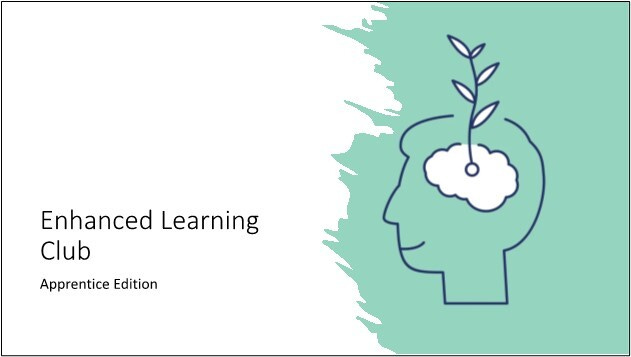
Some really fantastic systems | cybernetics | complexity material from SCiO (Systems and Complexity in Organisation) – the systems practitioner body https://www.linkedin.com/mynetwork/
The Pithead Baths of Great Britain https://modernisttourists.com/2017/01/01/the-pithead-baths-of-great-britain/

Assembly Theory is Cool … http://www.johannesjaeger.eu/blog/assembly-theory-is-cool
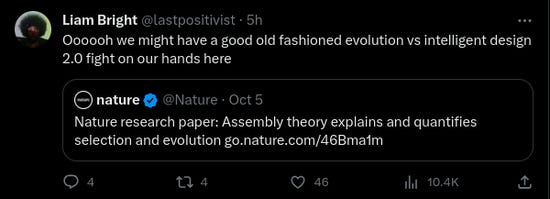
Join the RedQuadrant mailing list for monthly updates on opportunities, what we’re doing, events, and so on… http://redquadrant.com/newsletter
RedQuadrantNewsletter | RedQuadrantSign up for the RedQuadrant newsletter
Beyond forgetfulness: Why do so many people miss their hospital appointments? | Accurx Blog https://www.accurx.com/post/beyond-forgetfulness-why-do-so-many-people-miss-their-hospital-appointments

How does the NHS compare to the health care systems of other countries? https://www.kingsfund.org.uk/publications/nhs-compare-health-care-systems-other-countries?utm_term=thekingsfund&utm_source=Twitter&utm_medium=social
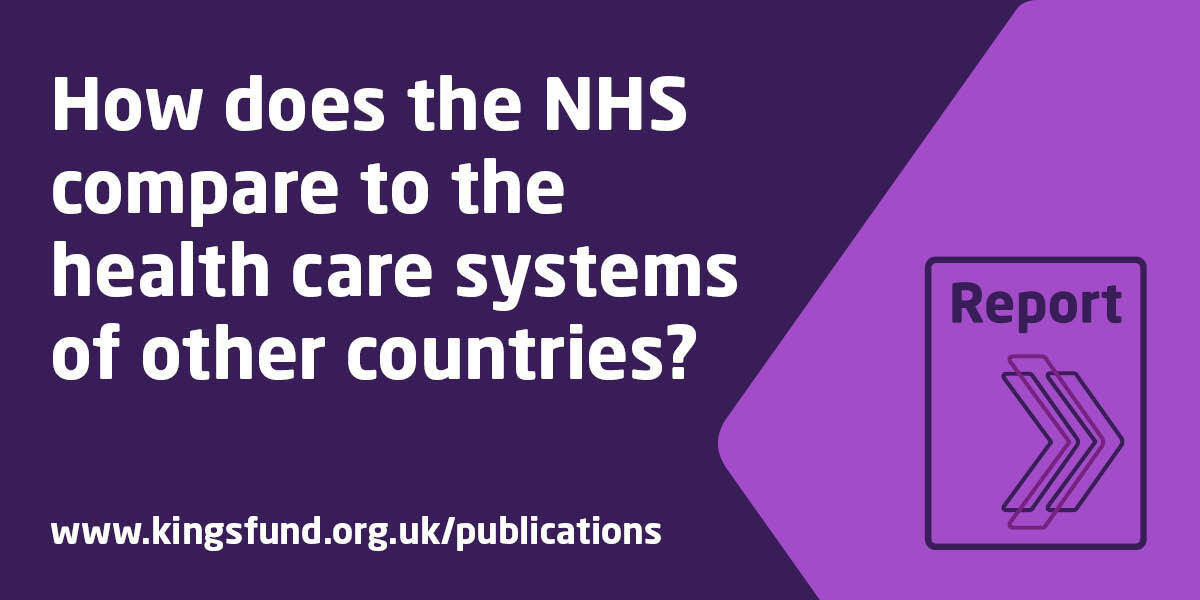
The Golden Moment https://squiretothegiants.com/2023/10/06/the-golden-moment/

OII | Geographies of Digital Exclusion: Data and Inequality https://www.oii.ox.ac.uk/research/publications/geographies-of-digital-exclusion-data-and-inequality/
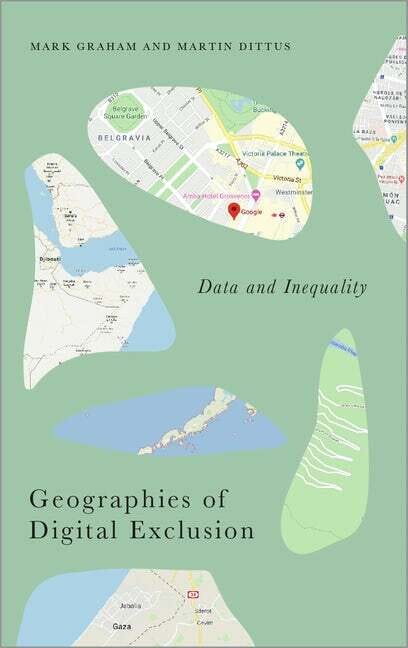
Running to Stand Still: Tom Bewick | FE News https://www.fenews.co.uk/skills/running-to-stand-still-tom-bewick/
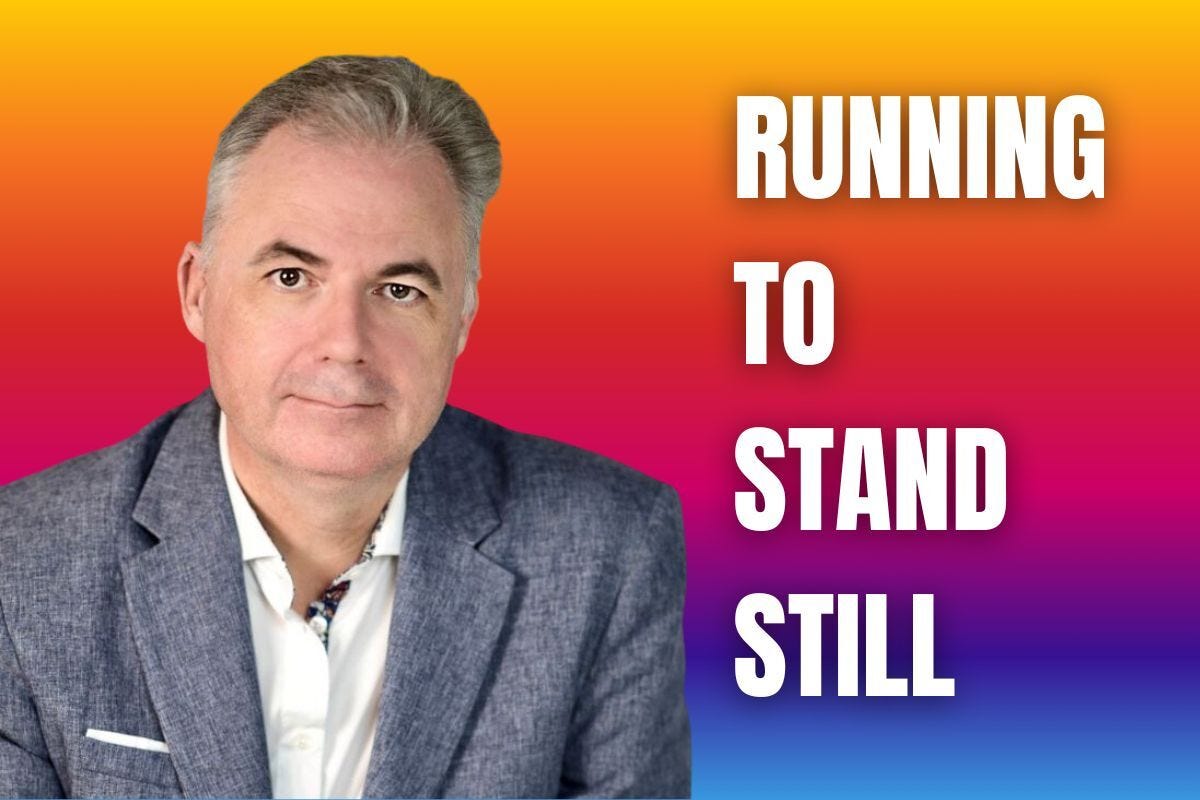
FE News · Sep 27Running to Stand Still: Tom Bewick | FE News| Running to Stand Still: Tom Bewick